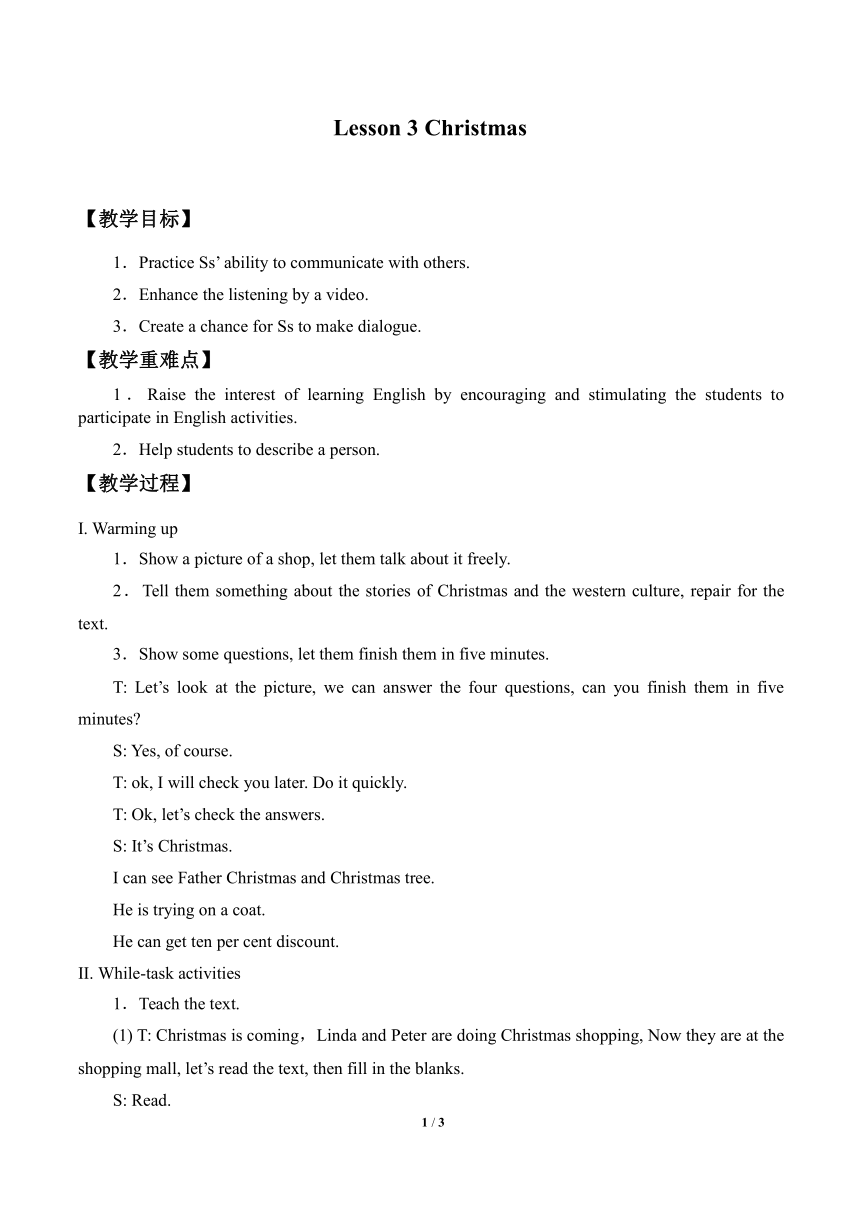
Lesson 3 Christmas 【教学目标】 1.Practice Ss’ ability to communicate with others. 2.Enhance the listening by a video. 3.Create a chance for Ss to make dialogue. 【教学重难点】 1.Raise the interest of learning English by encouraging and stimulating the students to participate in English activities. 2.Help students to describe a person. 【教学过程】 I. Warming up 1.Show a picture of a shop, let them talk about it freely. 2.Tell them something about the stories of Christmas and the western culture, repair for the text. 3.Show some questions, let them finish them in five minutes. T: Let抯 look at the picture, we can answer the four questions, can you finish them in five minutes? S: Yes, of course. T: ok, I will check you later. Do it quickly. T: Ok, let抯 check the answers. S: It抯 Christmas. I can see Father Christmas and Christmas tree. He is trying on a coat. He can get ten per cent discount. II. While-task activities 1.Teach the text. (1) T: Christmas is coming,Linda and Peter are doing Christmas shopping, Now they are at the shopping mall, let’s read the text, then fill in the blanks. S: Read. Show the answers to them, let them check themselves. (2) Do a pair work to ask and answer questions about the text? 2.Teach the tag question. (1) Ask one of pair to read the sentences. (2) Answer the questions. T: We can learn that 反义疑问句(The Disjunctive Question)又叫附加疑问句。 它表示提问人的看法,没有把握,需要对方证实。 反义疑问句由两部分组成:前一部分是一个陈述句,后一部分是一个简短的疑问句,两部分的人称时态应保持一致。 1.陈述部分肯定式,疑问部分否定式? 如:She was ill yesterday, wasn’t she? 2.陈述部分否定式(或有never,seldom, hardly,few,little,barely, scarcely, nothing等否定词时),疑问部分肯定式? 如:You didn’t go, did you? He can hardly swim, can he? They seldom come late, do they? 但:think, believe, suppose, imagine, expect等动词后接宾语从句,如果含有not的否定句,那么应将否定移到主句。 例如:I don't think the party is very good, is it? 反义疑问句的回答 用yes,no,但是,当陈述部分是否定形式时,回答要按事实。 如:They don’t work hard, do they? 他们不太努力工作,是吗? ———Yes, they do. 不,他们工作努力。 ———No, they don’t. 对,他们工作不努力。 Do some exercises to consolidate the using. 1.You’d rather watch TV this evening, _____? A.isn’t it B.hadn’t you C.wouldn’t you D.won’t you 2.I suppose you’re not going today, _____? A.are you B.do you C.don’t you D.aren’t you 3.I wish to shake hands with you, _____? A.shall B.may I C.do I D.will I 4.Three hours ought to be enough time, _____? A.oughtn’t three hours B.didn’t they C.shouldn’t it D.shouldn’t three hours 5.They have to study a lot, _____? A.don’t they B.haven’t they C.did they D.hadn’t they 答案为:1 C 2 A 3 B 4 C 5 A 1.T: Do you know the westerns how to celebrate Christmas? S: No/Yes T: Ok, let’s talk about it by reading a passage. And then finish two tasks below III. Post-task activities To make a short dialogue and ... ...
~~ 您好,已阅读到文档的结尾了 ~~

